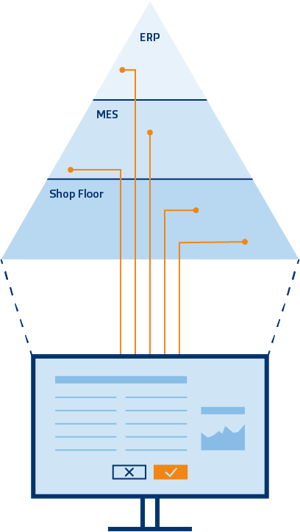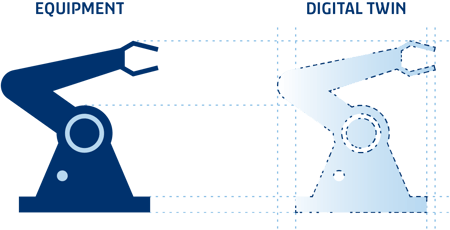SYSTEMA’s Equipment Integration Suite (EI Suite) provides a comprehensive solution to:
- integrate shopfloor equipment and systems
- orchestrate and automate production activities on the shopfloor
- achieve optimal productivity with minimal complexity
SYSTEMA’s EI Suite controls the behavior of manufacturing equipment and guides the actions of equipment operators through a unified user interface.
The Foundation of Manufacturing Automation
EI Suite enables many manufacturing automation capabilities, such as:
- connectivity of equipment and systems by providing a multitude of exchangeable connectors
- paperless manufacturing
- automated data collection
- recipe selection and recipe management
- load and go scenarios based on carrier identification
- run-to-run control in conjunction with the RMS
- automated non-productive material handling and tool qualification
- fully automated production by integrating automated material handling systems
Benefits
Accurate and timely data collection for data-driven decision making
Enhanced quantity of collected data and events provide a solid foundation for sophisticated analytics to inform process optimizations
Reduction of scrap and increase in yield by automatically controlling and adjusting the process at the equipment
Improved equipment utilization by removing delays caused by unavailable operators
Visibility into the state of production, enabling staff to understand quickly where and why the production landscape is experiencing issues
EI Suite Capabilities
SYSTEMA’s EI Suite is comprised of:
- a configurable workflow engine that orchestrates the automated process
- several standard equipment related modules (jobs, ports, data collection…) completing the digital twin of the real world equipment
- several connectors supporting standard protocols from SECS/GEM via OPC UA, Modbus, and file parsers to connect to IIoT Gateways integrating sensors and actuators and other systems
- several connectors for standard applications (MES, SPC, R2R…)
- a user interface for shopfloor personnel to easily understand and interact with the automated manufacturing process
- a configurable job setup system presenting information about the job, for example, work instructions and parameters, and allowing the user to adjust job parameters, for example, the material to be measured, when and where necessary
- a user interface for engineers to interact with automation to resolve issues and unforeseen exceptions while not breaking the automated process
- tools to deploy and operate the automation solutions
- extensions to augment missing functions in the CIM environment, for example, a RMS (Recipe Management System) and MTS (Material Tracking System)
Each of these capabilities is described below:
Factory Floor Control | Unified User Interface
SYSTEMA’s Factory Floor Control GUI (FFC GUI) is a comprehensive user interface that dramatically simplifies operator interactions with the various IT systems on the shopfloor. By unifying all underlying IT systems into a single user interface, shopfloor personnel simply interacts with the FFC GUI representing all underlying systems. Additionally, the FFC GUI provides shopfloor personnel with complete visibility into equipment status, dispatching lists, job creations, equipment events and alerts, KPIs, and information that resides within other integrated systems (SPC, QMS, RMS, etc). All shown information is updated in real-time, based on the event-driven approach the whole system is based on.

Digital Twin | Virtual Equipment Models
“Digital twin” refers to a virtual model – a comprehensive physical and functional representation – of a component, product, or process within a production environment. SYSTEMA’s EI Suite is based on the creation of digital twins to represent each piece of integrated equipment on the shopfloor, its capabilities, and its state model. Digital twins provide powerful capabilities for simulation, equipment control and monitoring, as well as process analysis, troubleshooting, and testing.

Equipment Automation | Equipment Control & Communication Software
Equipment automation software aggregates, organizes, and evaluates information from integrated shopfloor systems such as MES, RMS, SPC, digital twins, and others to monitor and control equipment states, actions, and equipment components, such as communications, ports, jobs, etc. The result is a well-orchestrated production environment with limited opportunity for human error. Automation also enables more flexible workforce planning by reducing the amount of training required for equipment operators.
James | Application Management Services
Think of James as a virtual butler that provides a window into the health of your manufacturing automation system components. James is a toolset for application management, monitoring, starting/stopping individual components, and orchestration of system updates to ensure that manufacturing automation applications are running smoothly. This toolset greatly simplifies the ongoing management and maintenance of the manufacturing automation system’s underlying components for your in-house IT team. Trust us, they will thank you.
SAM | Simulation, Analysis & Test Services
SAM is a powerful toolset. From diagnosing issues within the automation system components to providing a test environment for simulating changes to system components or processes before rolling them out into the live environment, SAM provides capabilities for shopfloor personnel to take on the perspective of the MES, SPC, QMS, and other integrated components for simulation, analysis, and testing.
How Does it Work?
Generally, the core component in a CIM environment is an MES or similar system to handle the management of products, processes, process flows, and equipment. Quite often there are additional systems taking care of shopfloor tasks, for example, Statistical Process Control, Recipe Management, Run-to-Run control, etc. With this in place, graduated levels of integration and automation capabilities are possible as follows:
Basic Equipment Integration
SYSTEMA’s EI Suite provides basic system and equipment integrations which permit data to flow from equipment to the computer integrated manufacturing (CIM) environment. This basic integration phase begins to replace manual activities like data collection and material and resource state tracking based on equipment events in the CIM applications via automation. This level of automation allows equipment operators to view work instructions, recipes, and equipment parameters from the MES. Checking conditions, for example, the recipe that is currently selected or other parameters at the equipment, is done and the user will be prevented from starting a job as long as the conditions aren’t met.
Equipment Automation
Equipment automation implements bi-directional communication between the MES and shopfloor equipment. This ensures that recipe selection, recipe body verification, and download, run-time parameter adjustments are handled automatically, simplifying the process for equipment operators. Includes integrations with:
Advanced Equipment Integration & Automation
Full integration between manufacturing IT systems and shopfloor equipment enables automated production processes where workflows are system-driven and require minimal supervision by shopfloor personnel. Advanced integration and automation, using the EI Suite, connect other shopfloor systems for further automation and optimization capabilities. While the possibilities are virtually endless, some common strategies involve integrations with:
- advanced process control systems (APC/R2R)
- retrofitted carrier/material identification systems
- automated material handling systems
- many other IT systems
EI Suite Implementation Options
Implementation of EI Suite is non-trivial and requires significant expertise in the areas of manufacturing processes, manufacturing automation, software development, and project management. SYSTEMA provides the following EI Suite implementation options to complement the level of IT support available within your organization:
Turnkey Implementation
This type of implementation may be best described as “full-service” with each aspect of project management, software development, implementation, training, and support provided by SYSTEMA.
Framework Implementation
Framework implementations are best suited to organizations that prefer to use SYSTEMA’s framework and handle their own development and implementation in a “self-service” fashion. In this case, SYSTEMA provides in-depth training and support options to allow your in-house IT team to develop and implement a custom solution using Eclipse-based development tools.
Why SYSTEMA?
At SYSTEMA, we understand the risks and challenges that come along with implementing automation solutions on the shopfloor. We have been providing training, consulting, and successful implementation of smart manufacturing solutions for 30 years. We continue to do so implementing solutions and customizing functionality with end-users in mind and by providing the support, training, and services necessary to empower users to independently leverage and manage the capabilities of their systems.
